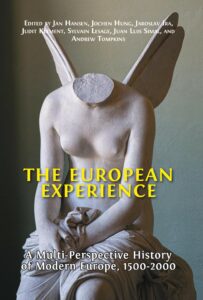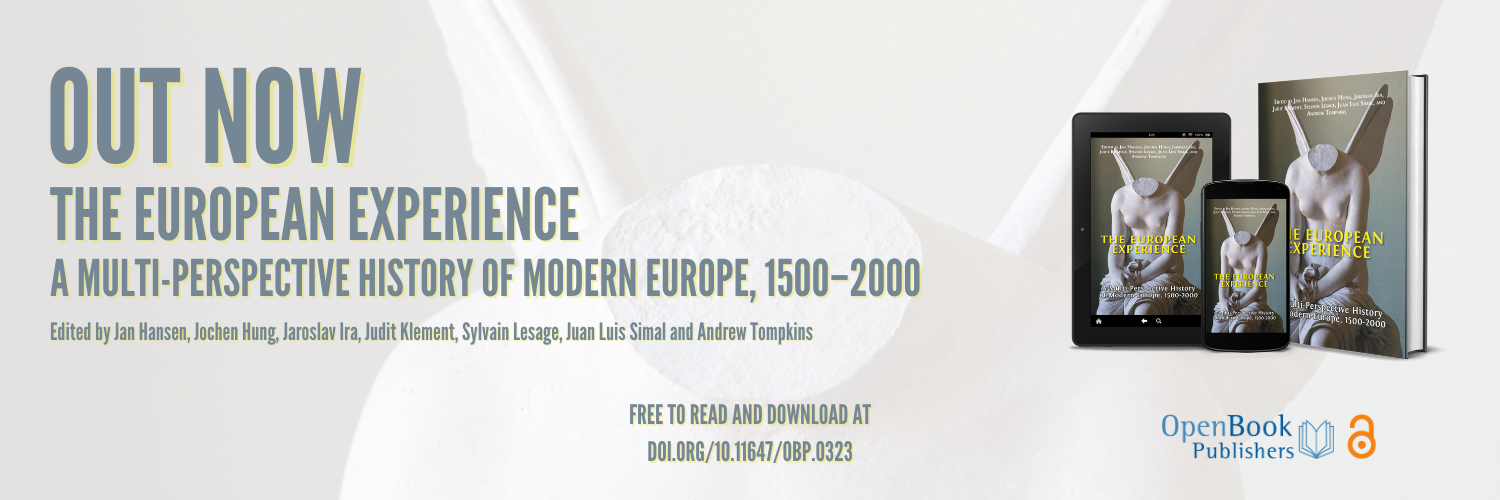The European Experience
 The textbook The European Experience brings together the expertise of nearly a hundred historians from eight European universities to internationalise and diversify the study of modern European history, exploring a grand sweep of time from 1500 to 2000. Offering a valuable corrective to the Anglocentric narratives of previous English-language textbooks, scholars from all over Europe have pooled their knowledge on comparative themes such as identities, cultural encounters, power and citizenship, and economic development to reflect the complexity and heterogeneous nature of the European experience. Rather than another grand narrative, the international author teams offer a multifaceted and rich perspective on the history of the continent of the past 500 years. Each major theme is dissected through three chronological sub-chapters, revealing how major social, political and historical trends manifested themselves in different European settings during the early modern (1500–1800), modern (1800–1900) and contemporary period (1900–2000).
The textbook The European Experience brings together the expertise of nearly a hundred historians from eight European universities to internationalise and diversify the study of modern European history, exploring a grand sweep of time from 1500 to 2000. Offering a valuable corrective to the Anglocentric narratives of previous English-language textbooks, scholars from all over Europe have pooled their knowledge on comparative themes such as identities, cultural encounters, power and citizenship, and economic development to reflect the complexity and heterogeneous nature of the European experience. Rather than another grand narrative, the international author teams offer a multifaceted and rich perspective on the history of the continent of the past 500 years. Each major theme is dissected through three chronological sub-chapters, revealing how major social, political and historical trends manifested themselves in different European settings during the early modern (1500–1800), modern (1800–1900) and contemporary period (1900–2000).
This resource is of utmost relevance to today’s history students in the light of ongoing internationalisation strategies for higher education curricula, as it delivers one of the first multi-perspective and truly ‘European’ analyses of the continent’s past. Beyond the provision of historical content, this textbook equips students with the intellectual tools to interrogate prevailing accounts of European history, and enables them to seek out additional perspectives in a bid to further enrich the discipline.
This open-access resource can be downloaded for free or ordered as hard copy via Open Book Publishers. The textbook’s individual chapters are also available online on the Historiana platform, enriched with additional visual material:
Unit 1: Identities
Unit 2: Societies
Unit 3: Power and Citizenship
- 3.1 State-building and Nationalism
- 3.2 Empire and Colonialism
- 3.3 Revolutions and Civil Wars
- 3.4 Peace and Conflict
Unit 4: Knowledge
- 4.1: Science and Technological Change
- 4.2: Social Engineering and Welfare
- 4.3: Education and Knowledge
- 4.4: Understanding and Controlling the Environment
Unit 5: Economy
- 5.1: Entrepreneurs, Companies and Markets
- 5.2: Distributing Wealth
- 5.3: Production and Consumption
- 5.4: Labour and Forced Labour
Unit 6: Living with Difference
Unit 7: Cultural Encounters
- 7.1: Experiments and Avant-Gardes
- 7.2: Mass Media and Popular Culture
- 7.3: Sports and Leisure
- 7.4: Heritage and Memory


